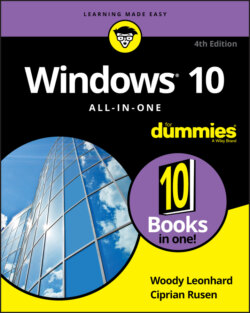Читать книгу Windows 10 All-in-One For Dummies - Ciprian Adrian Rusen, Woody Leonhard - Страница 76
ENCRYPTING FILE SYSTEM AND BITLOCKER
ОглавлениеEncrypting File System (EFS) is a method for encrypting individual files or groups of files on a hard drive. EFS starts after Windows boots: It runs as a program under Windows, which means it can leave traces of itself and the data that’s being encrypted in temporary Windows places that may be sniffed by exploit programs. The Windows directory isn’t encrypted by EFS, so bad guys (and girls!) who can get access to the directory can hammer it with brute-force password attacks. Widely available tools can crack EFS if the cracker can reboot the, uh, crackee’s computer. Thus, for example, EFS can’t protect the hard drive on a stolen laptop/notebook. Windows has supported EFS since the halcyon days of Windows 2000.
BitLocker was introduced in Windows Vista and has been improved since. BitLocker runs underneath Windows: It starts before Windows starts. The Windows partition on a BitLocker-protected drive is completely encrypted, so bad guys who try to get to the file system can’t find it.
EFS and BitLocker are complementary technologies: BitLocker provides coarse, all-or-nothing protection for an entire drive. EFS lets you scramble specific files or groups of files. Used together, they can be mighty hard to crack.
BitLocker To Go provides BitLocker-style protection to removable drives, including USB drives. You should use it when storing important data on your USB drives.
That leaves you with Windows 10 Home, unless you have a crying need to do one of the following:
Connect to a corporate network. If your company doesn’t give you a copy of Windows 10 Enterprise, you need to spend the extra bucks and buy Windows 10 Pro.
Play the role of the puppet — the host — in a Remote Desktop interaction. If you’re stuck with Remote Desktop, you must buy Windows 10 Pro.Note that you can use Remote Assistance, any time, on any Windows PC, any version. (See Book 7, Chapter 2.) This Windows 10 Pro restriction is specifically for Remote Desktop, which is commonly used inside companies but not that much by other types of users. Many businesspeople find that TeamViewer, a free alternative to Remote Desktop, does everything they need and that Remote Desktop amounts to overkill. TeamViewer lets you access and control your home or office PC from any place that has an Internet connection. Look at its website,
www.teamviewer.com.Provide added security to protect your data from prying eyes or to keep your notebook’s data safe even if it’s stolen. Start by determining whether you need Encrypting File System (EFS), BitLocker, or both (see the “Encrypting File System and BitLocker” sidebar). Win10 Pro has EFS and BitLocker — with BitLocker To Go tossed in for a bit o’ lagniappe.
Run Hyper-V. Some people can benefit from running virtual machines inside Windows 10. If you absolutely must get an old Windows XP program to cooperate, for example, running Hyper-V with a licensed copy of Windows XP may be the best choice. For most people, VMs are an interesting toy, but not much more.
Postpone Windows 10 updates up to a year. Unfortunately, Microsoft has dropped the ball on quality when it comes to Windows 10 updates. Each month there’s news of a buggy update that wrecks people’s computers. Windows 10 Pro gives people the option to postpone and control updates in a way that Windows 10 Home doesn’t.
